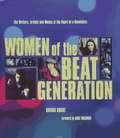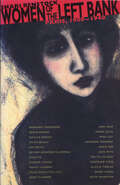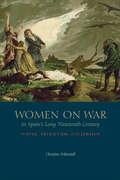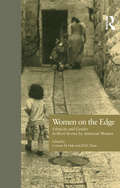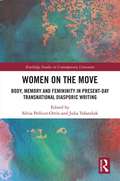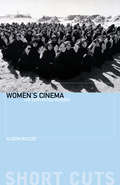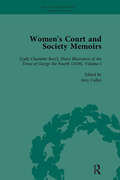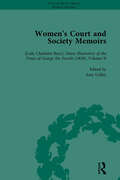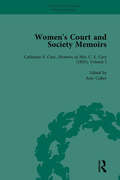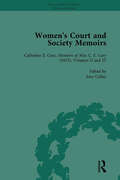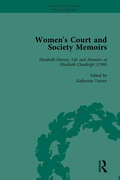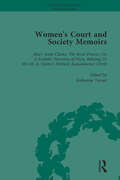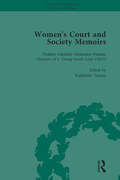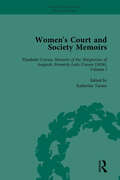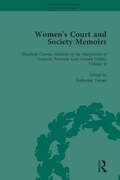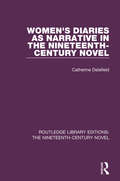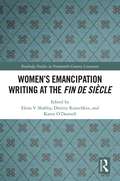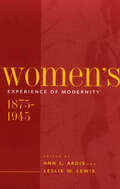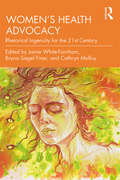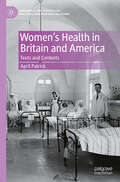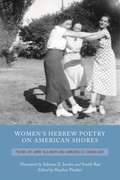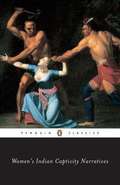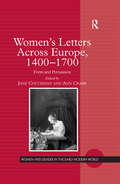- Table View
- List View
Women of the Beat Generation: The Writers, Artists and Muses at the Heart of a Revolution
by Brenda A. KnightA well-researched book brings to light the fact that the Beat Generation involved women too. This book narrates the sad stories of women married to Beat Poets.
Women of the Left Bank: Paris, 1900-1940
by Shari BenstockA “valuable and intriguing” study of the lives and works of literary women who shaped expatriate Paris (NPR).Focusing on some two dozen American, English, and French women whose talent shaped the Paris expatriate experience in the early twentieth century, from Anais Nin to Alice B. Toklas and beyond, this book shines new light on how gender was experienced and expressed during an important moment in modern literary history."Shari Benstock . . . weaves together, with great skill, the histories of an extraordinary group of talented women—publishers like Sylvia Beach, Caresse Crosby, Margaret Anderson, and Jane Heap, novelists Jean Rhys, Gertrude Stein, and Edith Wharton. She examines in some depth the writing produced by poets, journalists and novelists, thus combining literary criticism and social history in a seamless running narrative.” —NPR“Through their writings, including unpublished and newly available documentary sources of the period, Djuna Barnes, Nancy Cunard, Jean Rhys, Gertrude Stein, Edith Wharton and others are revealed as significant in the development of modernism, imagism and other avant-garde movements in which they were overshadowed or ignored by their male counterparts. . . . Benstock tracks the sexually liberated lifestyles and the creative originality of these women with a wealth of documentation.” —Publishers Weekly“An inspiration, setting a standard for literary history and feminist criticism that will be difficult to surpass.” —American Literature
Women on War in Spain’s Long Nineteenth Century: Virtue, Patriotism, Citizenship (Toronto Iberic)
by Christine ArkinstallThe ways in which women have historically authorized themselves to write on war has blurred conventionally gendered lines, intertwining the personal with the political. Women on War in Spain’s Long Nineteenth Century explores, through feminist lenses, the cultural representations of late nineteenth- and early twentieth-century Spanish women’s texts on war. Reshaping the current knowledge and understanding of key female authors in Spain’s fin de siècle, this book examines works by notable writers – including Rosario de Acuña, Blanca de los Rios, Concepción Arenal, and Carmen de Burgos – as they engage with the War of Independence, the Third Carlist War, Spain’s colonial wars, and World War I. The selected works foreground how women’s representations of war can challenge masculine conceptualizations of public and domestic spheres. Christine Arkinstall analyses the works’ overarching themes and symbols, such as honour, blood, the Virgin and the Mother, and the intersecting sexual, social, and racial contracts. In doing so, Arkinstall highlights how these texts imagine outcomes that deviate from established norms of femininity, offer new models to Spanish women, and interrogate the militaristic foundations of patriarchal societies.
Women on Women: An Anthology of American Lesbian Short Fiction
by Joan Nestle Naomi HolochThis groundbreaking collection brings together 28 stunning stories by literary talents never before assembled in a single volume. With contributions from both established and bright new voices in lesbian fiction, "Women on Women" ranges from the subtlety and restraint of Willa Cather's "Tommy, the Unsentimental" to Sapphire's daring and highly erotic "Eat" and Valerie Miner's suspenseful "Trespassing." Some of the stories are universal in theme - the joy and excitement of new romance, the ageless problems of family life, and the pain of lost love and of death. And many are written by or about members of racial, ethnic, and other minorities within the gay community. These are stories that offer stirring, eloquent, often passionate insights into the lesbian experience in a long-overdue collection that represents the best of lesbian short fiction from past to present.
Women on the Edge: Ethnicity and Gender in Short Stories by American Women (Wellesley Studies in Critical Theory, Literary History and Culture #Vol. 19)
by Corinne H. Dale J.H.E. PaineThis collection of essays explores the intertwining social conditions of ethnicity and gender as they are represented in short stories by contemporary American women. The introduction to the collection explains the theoretical understanding of gender and ethnicity as social constructions that provide a context for individual experience. The collection brings together analyses of short stories that focus on major ethnic cultures in the United States: Mexican American, Puerto Rican, Japanese American, Asian American, African American, Jewish American, white Protestant American, and Native American. Each essay testifies to the struggles of women within patriarchal cultures in America, and each explores how different ethnic identities set the terms of these gender struggles. The essays also reveal the complications of other important social issues, such as class, sexual preference, and religion. Individually, each essay contributes a significant new analysis of a short story or collection by an important contemporary American writer. Together, the essays indicate the complexity and significance of this cultural approach to women's fiction, demonstrate the critical theories that are currently developing in the fields of gender and ethnic studies, and suggest that neither ethnicity nor gender can legitimately be considered alone.
Women on the Move: Body, Memory and Femininity in Present-Day Transnational Diasporic Writing
by Silvia Pellicer-Ortín Julia TofantshukWomen on the Move: Body, Memory and Feminity in Present-day Transnational Diasporic Writing explores the role of women in the current globailized era as active migrants. the authors have brought together a collection of essays from scholars in diaspora, migration and gender studies to take a look at the female experince of migration and globalization by covering topics such as vulnerability, empowerment, trauma, identity, memory, violence and gender contruction, which will continue to shape contemporary literature and the culture at large.
Women's Cinema: The Contested Screen (Short Cuts)
by Alison ButlerWomen's Cinema provides an introduction to critical debates around women's filmmaking and relates those debates to a variety of cinematic practices. Taking her cue from the groundbreaking theories of Claire Johnston, Alison Butler argues that women's cinema is a minor cinema that exists inside other cinemas, inflecting and contesting the codes and systems of the major cinematic traditions from within. Using canonical directors and less established names, ranging from Chantal Akerman to Moufida Tlatli, as examples, Butler argues that women's cinema is unified in spite of its diversity by the ways in which it reworks cinematic conventions.
Women's Court and Society Memoirs, Part I Vol 1
by Amy Culley Katherine TurnerThese exhuberant stories of intrigue and scandal paint a vivid and colourful picture of society life.
Women's Court and Society Memoirs, Part I Vol 2
by Amy Culley Katherine TurnerThese exhuberant stories of intrigue and scandal paint a vivid and colourful picture of society life.
Women's Court and Society Memoirs, Part I Vol 3
by Amy Culley Katherine TurnerThese exhuberant stories of intrigue and scandal paint a vivid and colourful picture of society life.
Women's Court and Society Memoirs, Part I Vol 4
by Amy Culley Katherine TurnerThese exhuberant stories of intrigue and scandal paint a vivid and colourful picture of society life.
Women's Court and Society Memoirs, Part II vol 5
by Jennie Batchelor Amy Culley Katherine TurnerEach of the works in this collection documents the extraodinary fortunes of women whose real lives read like fiction.
Women's Court and Society Memoirs, Part II vol 6
by Jennie Batchelor Amy Culley Katherine TurnerEach of the works in this collection documents the extraodinary fortunes of women whose real lives read like fiction.
Women's Court and Society Memoirs, Part II vol 7
by Jennie Batchelor Amy Culley Katherine TurnerEach of the works in this collection documents the extraodinary fortunes of women whose real lives read like fiction.
Women's Court and Society Memoirs, Part II vol 8
by Jennie Batchelor Amy Culley Katherine TurnerEach of the works in this collection documents the extraodinary fortunes of women whose real lives read like fiction.
Women's Court and Society Memoirs, Part II vol 9
by Jennie Batchelor Amy Culley Katherine TurnerEach of the works in this collection documents the extraodinary fortunes of women whose real lives read like fiction.
Women's Diaries as Narrative in the Nineteenth-Century Novel (Routledge Library Editions: The Nineteenth-Century Novel #9)
by Catherine DelafieldFirst published in 2009, this book investigates the cultural significance of nineteenth-century women’s writing and reading practices. Beginning with an examination of non-fictional diaries and the practice of diary writing, it assesses the interaction between the fictional diary and other forms of literary production such as epistolary narrative, the periodical, the factual document and sensation fiction. The discrepancies between the private diary and its use as a narrative device are explored through the writings of Frances Burney, Elizabeth Gaskell, Anne Brontë, Dinah Craik, Wilkie Collins and Bram Stoker. It also considers women as writers, readers and subjects and demonstrates ways in which women could become performers of their own story through a narrative method which was authorized by their femininity and at the same time allowed them to challenge the myth of domestic womanhood. This book will be of interest to those studying 19th century literature and women in literature.
Women's Emancipation Writing at the Fin de Siecle (Routledge Studies in Nineteenth Century Literature)
by Elena V. Shabliy Dmitry Kurochkin O’Donnell KarenThis work investigates women’s emancipation writing in the second half of the nineteenth and the early twentieth centuries. Many novelists in various national literatures touched upon the theme of an emancipated woman in the long nineteenth century and at the fin de siècle. Philosophers, poets, writers, and journalists were concerned with this problem and began popularizing wholeheartedly the so-called "burning" questions. The new femininity was represented not only in the Christian context; many other traditions and cultures opened the discussion about the women’s lot. This volume analyzes women’s literary voices from different parts of the world—Turkey, England, the U.S., Italy, Russia, Spain, and others. Imagination, as it is believed, has no borders and is dialogical in its nature.
Women's Experience of Modernity, 1875-1945
by Ann L. Ardis Leslie W. LewisIn Women's Experience of Modernity, 1875–1945, literary scholars working with a variety of interdisciplinary methodologies move feminine phenomena from the margins of the study of modernity to its center. Analyzing such cultural practices as selling and shopping, political and social activism, urban field work and rural labor, radical discourses on feminine sexuality, and literary and artistic experimentation, this volume contributes to the rich vein of current feminist scholarship on the "gender of modernism" and challenges the assumption that modernism rose naturally or inevitably to the forefront of the cultural landscape at the turn of the twentieth century.During this period, "women's experience" was a rallying cry for feminists, a unifying cause that allowed women to work together to effect social change and make claims for women's rights in terms of their access to the public world—as voters, paid laborers, political activists, and artists commenting on life in the modern world. Women's experience, however, also proved to be a source of great divisiveness among women, for claims about its universality quickly unraveled to reveal the classism, racism, and Eurocentrism of various feminist activities and organizations.Complementing recent attempts to historicize literary modernism by providing more thorough analyses of its material production, the essays in this volume examine both literary and non-literary writings of Jane Addams, Djuna Barnes, Toru Dutt, Radclyffe Hall, H.D., Pauline Hopkins, Emma Dunham Kelley, Amy Levy, Alice Meynell, Bram Stoker, Ida B. Wells, Rebecca West, and others as discursive events that shape our conception of the historical real. Instead of focusing exclusively or even centrally on modernism and literature, these essays address a broad array of textual materials, from political pamphlets to gynecology textbooks, as they investigate women's responses to the rise of commodity capitalism, middle-class women's entrance into the labor force, the welfare state's invasion of the working-class home, and the intensified eroticization of racial and class differences.Contributors include: Ann L. Ardis, University of Delaware; Katherine L. Biers, University of Chicago; Clair Buck, Wheaton College; Lucy Burke, University of Manchester; Carolyn Burdett, University of North London; James Davis, Nassau Community College; Rita Felski, University of Virginia; Deborah Garfield, UCLA; Barbara Green, University of Notre Dame; Piya Pal-Lapinski, Bowling Green State University; Leslie W. Lewis, College of Saint Rose; Carla L. Peterson, University of Maryland; Francesca Sawaya, University of Oklahoma; Talia Schaffer, Queens College, CUNY; Alpana Sharma, Wright State University; Lynn Thiesmeyer, Keio University; Ana Parejo Vadillo, Birkbeck College, University of London; and Julian Yates, University of Delaware.
Women's Experience of Modernity, 1875–1945
by Ann L. Ardis, Leslie W. LewisA collection of essays on women&’s history and literary production at the turn of the twentieth century that centers the feminine phenomena. Analyzing such cultural practices as selling and shopping, political and social activism, urban field work and rural labor, radical discourses on feminine sexuality, and literary and artistic experimentation, this volume contributes to the rich vein of current feminist scholarship on the &“gender of modernism&” and challenges the assumption that modernism rose naturally or inevitably to the forefront of the cultural landscape at the turn of the twentieth century. During this period, &“women&’s experience&” was a rallying cry for feminists, a unifying cause that allowed women to work together to effect social change and make claims for women&’s rights. However, it also proved to be a source of great divisiveness among women, for claims about its universality quickly unraveled to reveal the classism, racism, and Eurocentrism of various feminist activities and organizations. The essays in this volume examine both literary and non-literary writings of Jane Addams, Djuna Barnes, Toru Dutt, Radclyffe Hall, H.D., Pauline Hopkins, Emma Dunham Kelley, Amy Levy, Alice Meynell, Bram Stoker, Ida B. Wells, Rebecca West, and others. Instead of focusing exclusively or even centrally on modernism and literature, these essays address a broad array of textual materials, from political pamphlets to gynecology textbooks, as they investigate women&’s responses to the rise of commodity capitalism, middle-class women&’s entrance into the labor force, the welfare state&’s invasion of the working-class home, and the intensified eroticization of racial and class differences.
Women's Health Advocacy: Rhetorical Ingenuity for the 21st Century
by Jamie White-Farnham Bryna Siegel Finer Cathryn MolloyWomen’s Health Advocacy brings together academic studies and personal narratives to demonstrate how women use a variety of arguments, forms of writing, and communication strategies to effect change in a health system that is not only often difficult to participate in, but which can be actively harmful. It explicates the concept of rhetorical ingenuity—the creation of rhetorical means for specific and technical, yet extremely personal, situations. At a time when women’s health concerns are at the center of national debate, this rhetorical ingenuity provides means for women to uncover latent sources of oppression in women’s health and medicine and to influence matters of research, funding, policy, and everyday access to healthcare in the face of exclusion and disenfranchisement. This accessible collection will be inspiring reading for academics and students in health communication, medical humanities, and women’s studies, as well as for activists, patients, and professionals.
Women's Health in Britain and America: Texts and Contexts (Humanities and Healthcare: Practical and Pedagogical Guides)
by April PatrickWomen’s Health in Britain and America: Texts and Contexts offers an unparalleled record of women’s health in the United Kingdom and the United States since 1750. Through chapters on pregnancy and childbirth, contraception and abortion, and breast and gynecological cancers, today’s readers can better understand historical precedents for contemporary issues. Introductory overviews present context about the history of medical care for women, such as diagnosis and treatment of specific conditions, medical advances, social and political contexts, and the effects of these on their lived experiences. The book presents a collection of primary texts including archival memoirs, letters, and diaries as well as published fiction, poetry, and medical advice. Women’s Health in Britain and America provides the necessary background for those new to the subject while also offering unique texts that will engage those already immersed in the field. As the political and social discussions around women’s bodies become more contentious and consequential, the history and the multiplicity of voices presented on these pages are more important than ever.
Women's Hebrew Poetry on American Shores: Poems by Anne Kleiman and Annabelle Farmelant
by Shachar Pinsker Adriana X. Jacobs Yosefa RazAlthough Anne (Chana) Kleiman--who died in 2011 at the age of 101--was the first American-born Jewish woman to publish poems in Hebrew, and Annabelle (Chana) Farmelant--who is still living and occasionally publishing--wrote a substantial body of Hebrew verse from the 1940s to the 1960s, their work is virtually unknown today, even to those familiar with Hebrew literature in America. In Women's Hebrew Poetry on American Shores: Poems by Anne Kleiman and Annabelle Farmelant, editor Shachar Pinsker recovers the singular voices of these women, introducing their captivating and wide--ranging poetry and placing it in its historical, literary, and cultural contexts. Women's Hebrew Poetry on American Shores presents a bilingual edition of Kleiman and Farmelant's work in a large range of themes, moods, and styles, translated into English for the first time by Adriana X. Jacobs and Yosefa Raz. It includes Kleiman's poems that were collected and published in a 1947 U.S. volume and a selection from two of Farmelant's poetry books, published in Jerusalem in 1960 and 1961. The translators have furnished the poems with copious notes, illuminating linguistic and cultural sources of the poetry and making it more accessible to contemporary readers. Pinsker introduces the volume with a background on the poets' lives and work and a look at the state of Hebrew literature in the first half of the twentieth century. The volume also includes an unpublished essay by Anne Kleiman, addressing Hebrew poet Anda Pinkerfeld and her poetic work, which sheds an important light on the dialogue between women's Hebrew poetry written in American and in Palestine during the same period. Readers and scholars of Jewish, American, and Hebrew literature and cultural history, as well as those interested in poetry, gender, and women's studies will enjoy this unique bilingual edition.
Women's Indian Captivity Narratives
by Kathryn Zabelle Derounian-Stodola (EditorEnthralling generations of readers, the narrative of capture by Native Americans is arguably the first American literary form dominated by women's experiences. Many such captivity narratives were fact-based but often transformed by authors or editors into spellbinding adventure stories, sentimental tales, spiritual autobiographies, or anti-Indian propaganda. For this pioneering collection of 10 extraordinary tales for this most intriguing and enduring literary genre, Kathryn Zabelle Derounian-Stodola has selected narratives that span 200 years (1682-1892) and display literary as well as geographical diversity. Her fascinating introduction to the history and influence of the genre shows it to be a foundation text of American culture with enduring popular appeal.
Women's Letters Across Europe, 1400–1700: Form and Persuasion (Women and Gender in the Early Modern World)
by Jane CouchmanIn response to a growing interest, among historians as well as literary critics, in women's use of the epistolary genre, Women's Letters Across Europe, 1400-1700: Form and Persuasion analyzes persuasive techniques in the personal correspondence of late medieval and early modern women. It includes studies of well-known women (Isabella d'Este, Teresa of Avila, Marguerite de Navarre, Catherine de Medicis), of those less-known (Alessandra Macigni Strozzi, Louise de Coligny, Glikl of Hameln, Argula von Grumbach, Luisa de Carvajal y Mendoza, Anna Maria von Schurman, Barbara of Brandenburg ) and of others virtually unknown to history (prosperous women like Elizabeth Stonor and Cornelia Collonello and pauper women seeking poor relief in Tours). Comprehensive in scope, Women's Letters Across Europe, 1400-1700 looks at women from England, Italy, France, Spain, Germany, and the Netherlands, and from various levels of society, encompassing the nobility, the gentry, the middle class, and the poor. Each of the essayists considers letters both as historical documents giving insights into women's lives, and as texts in which variations on epistolary forms are used for specific persuasive purposes. The authors of the essays analyze their subjects' capabilities and limitations as letter writers and the techniques they used to influence correspondents, setting these observations in the framework of the women's particular 'stories.' Taken together, the essays and the letter writers discussed therein illustrate in new ways how far from silenced many early modern women were, how they were able to adopt and adapt strategies from the epistolary conventions available to them, and how they could have an impact on their worlds through their letters.
